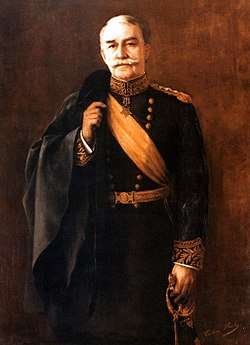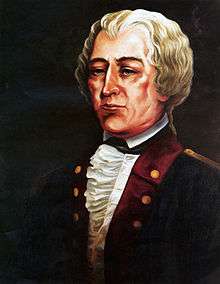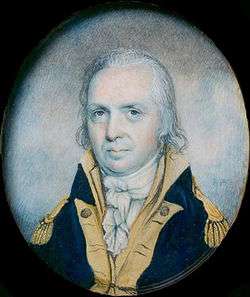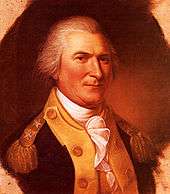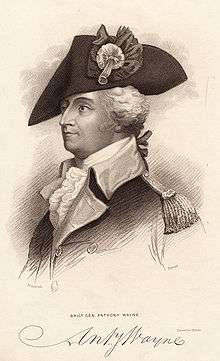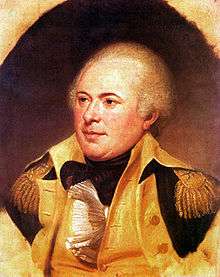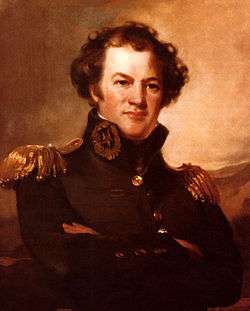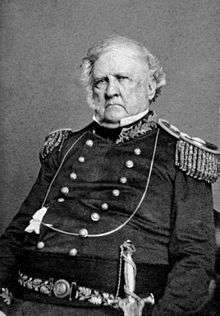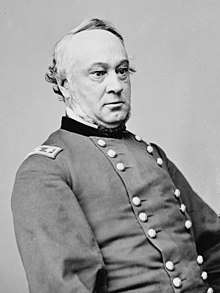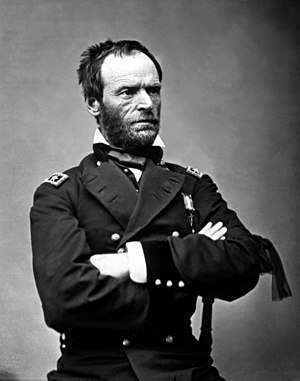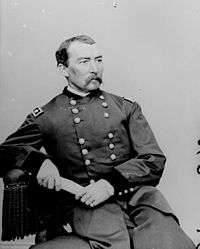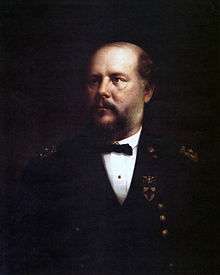Commanding General of the United States Army
| Commanding General of the United States Army | |
|---|---|
|
United States Army United States Department of War | |
| Status | Senior-most officer |
| Reports to | United States Secretary of War |
| Seat | Several HQs (Washington) |
| Appointer |
The President with Congress advice and consent |
| Term length | No fixed term |
| Constituting instrument | An Act of the Second Continental Congress |
| Formation |
15 June 1775 June 1821 |
| First holder |
GEN George Washington as Commander-in-Chief of the Continental Army MG Jacob Brown as Commanding General of the United States Army |
| Final holder | LTG Nelson A. Miles |
| Abolished | 8 August 1903 |
| Succession | Chief of Staff of the Army |
Prior to the institution of the Chief of Staff of the Army in 1903, there was generally recognized to be a single senior-most officer in the United States Army (and its predecessor the Continental Army), even though there was not a statutory office as such. During the American Revolutionary War (1775–1783), the title was Commander-in-Chief of the Continental Army. In 1783, the title was simplified to Senior Officer of the United States Army. In 1821, the title was changed to Commanding General of the United States Army. The office was often referred to by various other titles, such as "Major General Commanding the Army" or "General-in-Chief."
From 1789 until its abolition in 1903, the position of Commanding General was legally subordinate to the Secretary of War, although this was at times contested.[lower-alpha 1]
The position was abolished with the creation of the statutory Chief of Staff of the Army in 1903.
Office holders
† denotes people who died in office.
Commander-in-Chief of the Continental Army
| № | Commander-in-Chief | Took office | Left office | Time in office | |
|---|---|---|---|---|---|
| 1 | General[lower-alpha 2] George Washington (1732–1799) [lower-alpha 3] | 15 June 1775 | 23 December 1783 | 8 years, 191 days |
Senior Officer of the United States Army
| № | Senior Officer | Took office | Left office | Time in office | |
|---|---|---|---|---|---|
| 1 | Major general Henry Knox (1750–1806) [lower-alpha 4] | 23 December 1783 | 20 June 1784 | 180 days | |
| 2 | Brevet Major John Doughty (1754–1826) [lower-alpha 5] | 20 June 1784 | 12 August 1784 | 53 days | |
| 3 | Brevet Brigadier general Josiah Harmar (1753–1813) [lower-alpha 6] | 12 August 1784 | 4 March 1791 | 6 years, 204 days | |
| 4 | Major general Arthur St. Clair (1736–1818) [lower-alpha 7] | 4 March 1791 | 5 March 1792 | 1 year, 1 day | |
| 5 | Major general Anthony Wayne (1745–1796) | 13 April 1792 | 15 December 1796 † | 4 years, 246 days | |
| 6 | Brigadier general James Wilkinson (1757–1825) | 15 December 1796 | 13 July 1798 | 1 year, 210 days | |
| 7 | Lieutenant general George Washington (1732–1799) [lower-alpha 8] | 13 July 1798 | 14 December 1799 † | 1 year, 154 days | |
| 8 | Major general Alexander Hamilton (1755/1757–1804) [lower-alpha 9] | 14 December 1799 | 15 June 1800 | 183 days | |
| (6) | Brigadier general[lower-alpha 10] James Wilkinson (1757–1825) | 15 June 1800 | 27 January 1812 | 11 years, 226 days | |
| 9 | Major general Henry Dearborn (1751–1829) [lower-alpha 11] | 27 January 1812 | 15 June 1815 | 3 years, 139 days | |
| 10 | Major general Jacob Brown (1775–1828) [lower-alpha 12] | 15 June 1815 | June 1821 | 5 years, 351 days |
Commanding General of the United States Army
| № | Commanding General | Took office | Left office | Time in office | ||
|---|---|---|---|---|---|---|
| 1 | Major general Jacob Brown (1775–1828) | June 1821 | 24 February 1828 † | 6 years, 268 days | ||
| 2 | Major general Alexander Macomb (1782–1841) | 29 May 1828 | 25 June 1841 † | 13 years, 27 days | ||
| 3 | Brevet Lieutenant general Winfield Scott (1786–1866) [lower-alpha 13] | 5 July 1841 | 1 November 1861 | 20 years, 119 days | ||
| 4 | Major general George B. McClellan (1826–1885) [lower-alpha 14] | 1 November 1861 | 11 March 1862 | 130 days | ||
| Position vacant (11 March 1862 – 23 July 1862)[lower-alpha 15] | ||||||
| 5 | Major general Henry Halleck (1815–1872) [lower-alpha 16] | 23 July 1862 | 9 March 1864 | 1 year, 230 days | ||
| 6 | General of the Army Ulysses S. Grant (1822–1885) [lower-alpha 17] | 9 March 1864 | 4 March 1869 | 4 years, 360 days | ||
| 7 | General of the Army William Tecumseh Sherman (1820–1891) [lower-alpha 18] | 8 March 1869 | 1 November 1883 | 14 years, 238 days | ||
| 8 | General of the Army Philip Sheridan (1831–1888) | 1 November 1883 | 5 August 1888 † | 4 years, 278 days | ||
| 9 | Lieutenant general John Schofield (1831–1906) [lower-alpha 19] | 14 August 1888 | 29 September 1895 | 7 years, 46 days | ||
| 10 | Lieutenant general Nelson A. Miles (1839–1925) [lower-alpha 19] | 5 October 1895 | 8 August 1903 | 7 years, 307 days | ||
See also
Notes
- ↑ King
- ↑ Promoted posthumously to General of the Armies in 1976, by an Act of Congress (Public Law 94-479) as part of the United States Bicentennial.
- ↑ Appointed by the Second Continental Congress, after being nominated by Samuel Adams and John Adams. Resigned to the Congress of the Confederation, at the end of the American Revolutionary War.
- ↑ Resigned to begin career farming and developing land in Maine; appointed Secretary of War under Articles of Confederation in 1785.
- ↑ Served when all of the Army but 80 men were discharged.
- ↑ Removed by President George Washington in the aftermath of the Harmar Campaign.
- ↑ Simultaneously served as Governor of the Northwest Territory (1787–1802). Resigned as Senior Officer at the request of President George Washington, in the aftermath of the St. Clair's Defeat.
- ↑ Appointed during the Quasi-War against the French Republic. Did not actively command the Army during this period but was prepared to lead the Army if the need arose.
- ↑ Previously served as Secretary of the Treasury (1789–1795). Served as Inspector General of the Army with rank of major general from July 19, 1798. Became Senior Officer in the Army after the death of Washington.
- ↑ Promoted to major general during the War of 1812 and retired on June 15, 1815.
- ↑ Previously served as Secretary of War (1801–1809). Last American Revolutionary War veteran to serve as Senior Officer.
- ↑ Appointed Commanding General of the Army.
- ↑ Personally commanded the Army in the Battle for Mexico City in 1847, during the Mexican–American War. Upon his retirement, at the commencement of the American Civil War, he was the oldest serving Commanding General of the U.S. Army in history at age 75.
- ↑ Simultaneously served as Commander of the Army of the Potomac. Removed by President Abraham Lincoln in order to focus on the Peninsula Campaign.
- ↑ Eicher, Civil War High Commands. The gap from March 11, 1862 to July 23, 1862 was filled with direct control of the army by President Abraham Lincoln and Secretary of War Edwin Stanton, with the help of an unofficial "War Board" that was established on March 17, 1862. The board consisted of Ethan A. Hitchcock, the chairman, with Department of War bureau chiefs Lorenzo Thomas, Montgomery C. Meigs, Joseph G. Totten, James W. Ripley, and Joseph P. Taylor.
- ↑ Reassigned as the Army's chief of staff, subordinate to Grant.
- ↑ Resigned to become the 18th President of the United States (1869–1877).
- ↑ Resigned position; retired upon reaching mandatory retirement age of 64 in 1884.
- 1 2 Retired upon reaching mandatory retirement age of 64.
Bibliography
- Historical Resources Branch; United States Army Center of Military History.
- Eicher, John H.; Eicher, David J. (2001). Civil War High Commands. Stanford University Press. ISBN 0-8047-3641-3.
- Bell, William Gardner (2005). Commanding Generals and Chiefs of Staff 1775-2005: Portraits and Biographical Sketches. Washington, D.C.: United States Army Center of Military History.
- King, Archibald (1949/1960 reprint). Command of the Army (PDF). Military Affairs. Charlottesville, Virginia: The Judge Advocate General's School, U.S. Army. Check date values in:
|year=(help)
